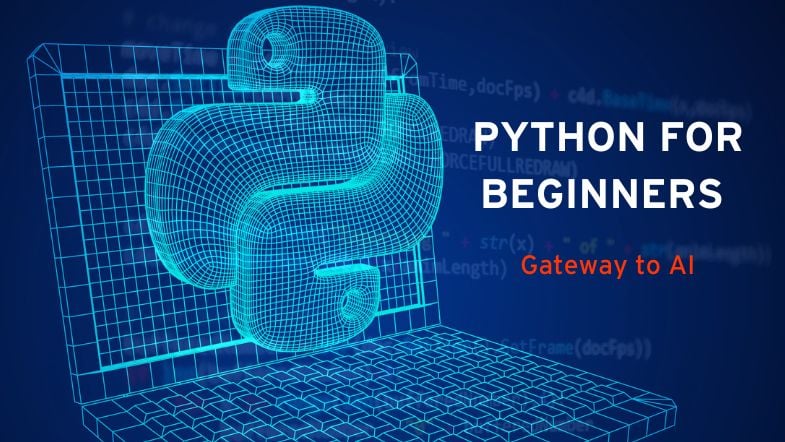Artificial Intelligence has evolved from science fiction into reality and now changes industries as well as daily routines in work, education and personal life. Python stands as a central programming language that has led the development of AI applications, automation tools, and data analytics.
If you’re new to coding, Python is the perfect place to start your journey into the world of AI. In this blog, we’ll explore why Python offers the best foundation for beginner programmers, its connection to AI tech, and practical ways to develop your expertise in programming.
Why Python Is Perfect for Beginners

Python attracts both newcomers and experts through its logical approach. The language remains simple to learn yet handles complex tasks with ease. A large collection of tools, libraries, and frameworks add to its value.
1. Easy to Learn and Use
Python features clear and easy-to-read code that resembles everyday language. A clean structure helps students or newcomers understand basic programming ideas with minimal confusion.
Example:
Here’s how Python compares to other languages for a simple “Hello, World!” program:
-
Python: print("Hello, World!")
-
Java: System. out.println("Hello, World!");
-
C++: #include <iostream> int main() { std::cout << "Hello, World!"; return 0; }
As you can see, Python’s clean and concise syntax reduces complexity, making it ideal for beginners.
2. Versatile Applications
Python serves multiple purposes, not only artificial intelligence. Software engineers apply it to website creation, data analysis and game programming.
A developer who masters this language has the flexibility to explore numerous tech fields without the need to study additional programming languages.
3. A Vast Ecosystem of Libraries and Tools

Python offers numerous helpful libraries, including NumPy, Pandas, and TensorFlow. These tools really simplify complex operations in data analysis, machine learning and deep learning frameworks.
Python’s Role in AI and Machine Learning
Python stands at the heart of AI development, along with tools that range from chatbots to self-driving vehicles. The language's simple structure connects perfectly to AI frameworks, which makes Python a top pick for both scientists and coders.
1. Data Processing and Analysis
AI systems need vast amounts of data along with Python tools such as Pandas or NumPy, which excel at organising, adjusting, and examining information.
Example Use Case:
A marketing analyst uses Python to clean, sort, and analyse customer data to predict buying trends.
2. Machine Learning and Deep Learning
Python libraries like Scikit Learn, along with TensorFlow, make machine learning models simple to build. A developer creates recommendation systems, detects fraudulent activity or performs image analysis through such applications.
Example Use Case:
An e-commerce platform uses a machine learning model built in Python to recommend products based on user preferences.
3. Natural Language Processing (NLP)
Natural language processing exists as a field of artificial intelligence that focuses on human communication patterns. A developer uses these packages to perform text analysis, translate between languages or create interactive chatbots.
Example Use Case:

A company uses Python's NLP libraries, such as NLTK and spaCy, to analyse customer sentiment in product reviews and improve services.
Real-World Applications of Python in AI
Python is driving some of the most exciting AI innovations across industries:
-
Healthcare: The diagnostic tools run on Python to examine X-rays or scans for early disease detection.
-
Finance: Fraud detection systems leverage Python’s machine-learning libraries to identify suspicious activities.
-
Retail: A combination of Python-based algorithms creates very accurate product suggestions for shoppers.
-
Transportation: Self-driving cars rely on Python to process sensor input and make real-time driving decisions.
-
Education: Learning software applies Python to adjust study materials based on each student's progress or needs.
How to Get Started with Python

Getting started with Python is easier than you might think. Follow these steps to begin your journey:
1. Install Python
Download and install Python from python.org. The latest version includes all the features a beginner needs.
2. Choose an IDE or Code Editor
Use a beginner-friendly environment like IDLE, PyCharm, or Jupyter Notebook to write and test your Python code.
3. Learn the Basics
Start with fundamental concepts such as variables, data types, and control structures.
Example: A simple Python program to calculate the area of a rectangle:
length = 5
width = 10
area = length * width
print("The area of the rectangle is:", area)
4. Explore Python Libraries
Once you're comfortable with Python basics, you can start using its powerful libraries for various tasks.
Here are some beginner-friendly libraries to explore:
-
NumPy for numerical computations.
-
Pandas for data analysis.
-
Matplotlib for data visualisation.
5. Work on Projects
Apply your knowledge by working on real-world projects like:
-
Building a simple calculator.
-
Creating a weather app using an API.
-
Developing a chatbot with basic NLP.
Common Mistakes Beginners Should Avoid
-
Skipping the Basics: Don’t rush into advanced topics without mastering the fundamentals.
-
Overloading with Libraries: Start with core libraries before diving into specialised ones.
-
Not Practising Enough: Coding regularly is key to improving your skills.
Why Learn Python with Nexacu?
At Nexacu, we provide Python for Beginners courses led by experts to help you:
-
Understand Python’s fundamentals.
-
Explore its applications in AI and automation.
-
Gain hands-on experience through practical exercises.
Our structured learning paths and real-world examples ensure that you’re ready to tackle real-world challenges.
Take the First Step Toward AI Mastery
Python opens your path into artificial intelligence. Language serves as a fundamental tool for creating AI systems, analysing information, or automating repetitive work. A basic knowledge of Python leads programmers as well as beginners to really exciting opportunities in tech development.
Explore Python Courses and Enrol Now


























